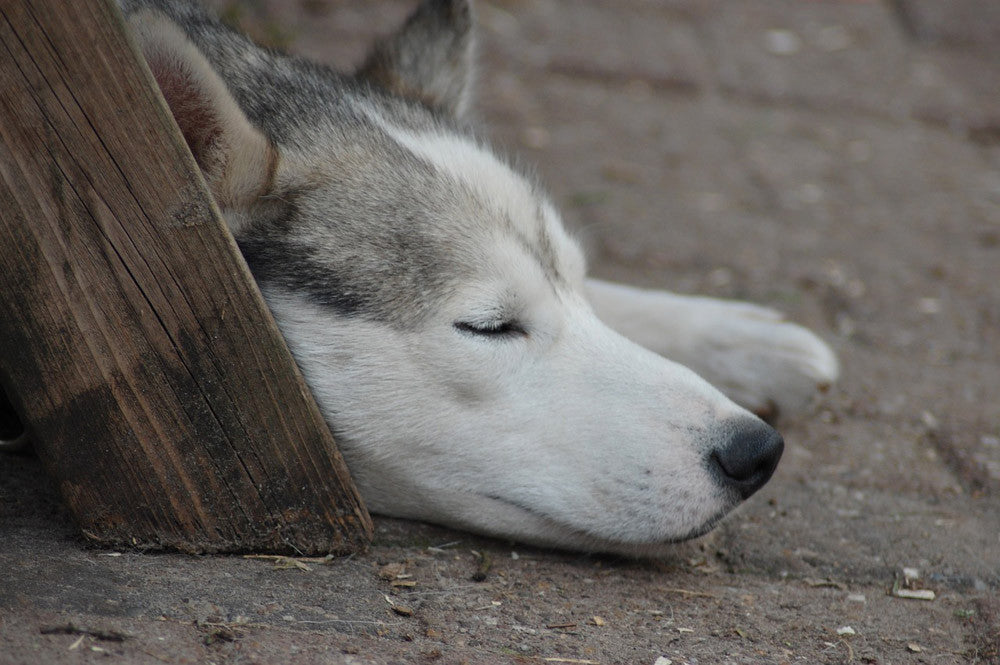Why Every Dog Needs a Den
Dog Dens in the Wild
Dogs may have been domesticated thousands of years ago, but they are still ruled by their natural instincts. These innate traits govern the way dogs act and respond to stimuli. "Denning," where a dog builds and retreats to a shelter, is one such ancient behavior also observed in their wild relatives like wolves and foxes. These denning instincts show themselves whenever your dog digs up the yard on a hot day or hides under the kitchen table during a thunderstorm.
There is some debate as to whether or not canids like domesticated dogs are true "den-dwelling" animals, which can get confusing without the right context. People who assert that dogs shouldn't be considered den animals point to natural wolf behavior. Wolves, domesticated dogs' closest wild relatives, only den for part of the year when they give birth to pups. Once the pups are a few weeks old, they start sleeping out in the open with the other wolves in their pack. Likewise, many wild canids may hide in confined areas in an emergency, but these aren't permanent shelters. Meanwhile, some canids like foxes do dig dens that they regularly return to when escaping the elements. Also, in hot climates, wild canids often dig holes to cool down. For many, these behaviors are enough to qualify canids like dogs as den animals. However, others assert that the only proper "den dwellers" are animals like gophers and moles, which spend most of the year in their burrows. For this school of thought, dogs are "animals that use dens" rather than "den animals."
Whether or not dogs are den animals in a technical sense simply boils down to semantics. Regardless of one's definition, wild canids do use dens under certain circumstances, and some of this denning instinct has been passed down to modern dogs. Additionally, one often-ignored fact to remember is that, as an aspect of their domestication, dogs retain more juvenile behaviors and traits into adulthood compared to wild canids. That includes things like barking, floppy ears, and (often) sleeping in dens. Additionally, regardless of whether or not den dwelling is "natural," research has clearly shown that domesticated dogs seek out and benefit from having a sanctuary of their own.
Dogs are Happier with a Den
Because canine mothers construct maternity dens for their pups, adult dogs often associate dark, enclosed spaces with memories of puppyhood. This feeling of safety and security has a soothing effect. When dogs are stressed out, they seek that comfort by retreating to a den. As their surrogate parents, it's our job as humans to provide them with a suitable shelter.
Dens are especially important for dogs with separation anxiety for two reasons: When properly acclimated to a quality dog den, an anxious pup is more likely to stay calm when left alone in if he's in his sanctuary. Likewise, his owner will be at ease knowing the dog isn't destroying the house — or trying to make a den out of torn couch cushions.
In some cases, dog dens do cause distress. However, this is almost always due to improper crate training. When a dog is punished with crate time or locked in a crate alone for too long, it stops being a den. The dog begins to associate the crate with unpleasantness rather than the comfort of puppyhood. When that happens, the crate loses its ability to calm.
Anxiety in Dogs
in the wild, fear has its benefits. Most things in nature that make loud noises — a common trigger for canine anxiety — are deadly. Canids who fled or sought shelter at the sound of thunder or a lion's roar were more likely to survive than their less cautious counterparts. "Anxious" doggie ancestors thrived, eventually passing on this trait to modern pooches.
Fortunately, your dog isn't in constant mortal danger. Unfortunately, the instincts that guided his ancestors still come into play. When these instincts no longer serve a purpose, what was previously prudent caution becomes an irrational fear.
Drawbacks of Anti-Anxiety Treatments
Vets will often prescribe medication to treat anxiety that come with their own set of problems. Short-acting sedatives are given "as needed" and take time to start working. Likewise, a human must be there to recognize the anxiety and administer the pill. You won't always be around when your dog is at his most anxious. Antidepressants work continuously, but they must still be given to the dog on a consistent daily basis. Also, it takes weeks and sometimes months for these drugs to deliver results.
Anyone who has taken anti-anxiety medications themselves can tell you they come with a long list of side effects. Many of these are worse than the symptoms they treat. And, unfortunately, a vet can't ask a dog about changes to his quality of life.
Cost is another factor. Although many of these medications are inexpensive on a per-pill basis, they add up when used long term. Also, a dog must typically see the prescribing vet at regular intervals. Ironically, all of these expensive extra vet visits may then further elevate your dog's anxiety level.
While anxiety medications are still useful in special cases, a more holistic approach is usually best for both dogs and their owners.
Zencrate to the Rescue!
We've made it our mission at Zencrate to create the best anxiety-fighting dog den possible. The Zencrate uses the latest modern technology to cater to your dog's primal instincts. Its opaque outer cover blocks light so your dog can snooze peacefully on the memory foam padding inside. To keep unwanted noise at bay, the den features sound-dampening insulation, support, and overall structure. Motion-activated sensors turn on an internal fan, soothing music, and an optional WiFi camera. All these features add up to a den that's dark, cool, comfortable, and free of negative stimuli — the perfect calming environment for your dog.


